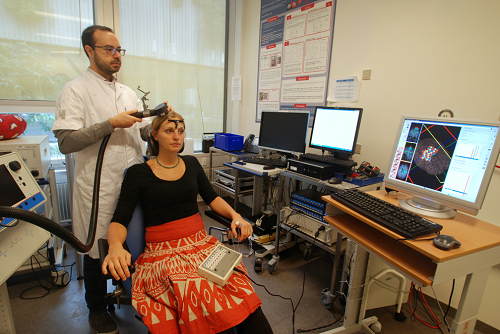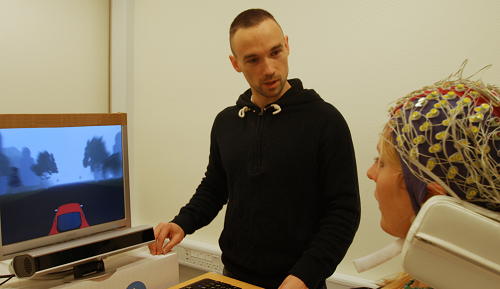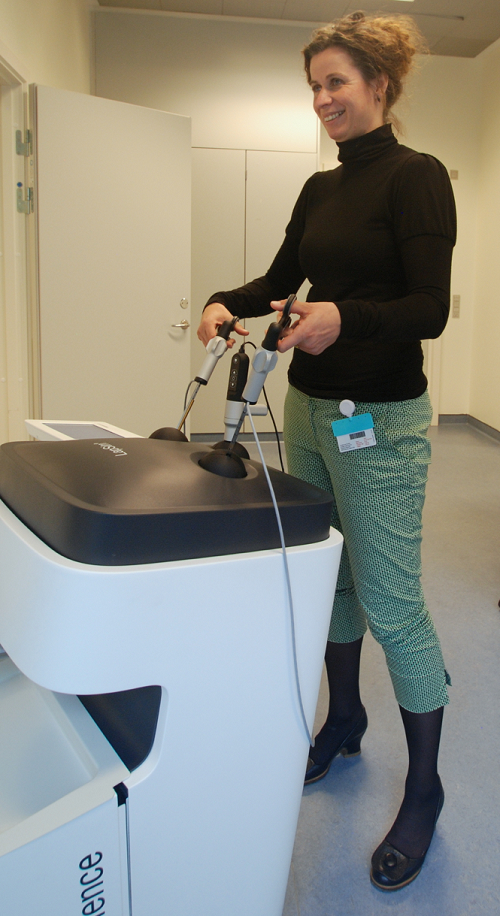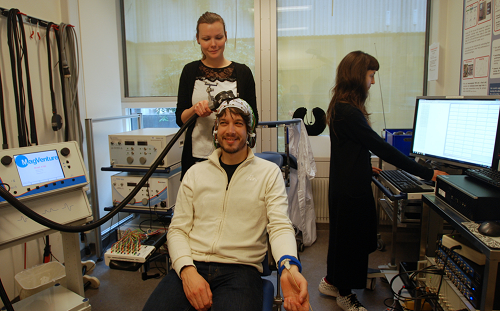
In daily life, we need to flexibly adjust our actions to the challenges imposed by our environment, our internal state and last but not least the social context a situation is embedded in. Hence, our brain needs to flexibly integrate relevant contextual information when it is required during voluntary actions. Here motor control and decision making play a key role to guide and shape our behavior. Using multimodal brain mapping, non-invasive brain stimulation and computational modelling, the ContAct Group and its international collaborators aimed to reveal the underlying neural mechanisms and motor-networks mediating these flexible actions. The ContAct Group continues as an active research group beyond the funding period. Research projects and ideas are discussed at weekly meetings. Furthermore, the ContAct journal club provides a biweekly discussion forum about articles related to action control.
Major Results
During the 6 years of funding, the ContAct group has produced more than 60 publications. The funding has provided indispensable support to a number of research careers, leading to the establishment of research groups and permanent positions, such as the associate professorships at DTU awarded to Axel Thielscher, Tim Dyrby and Kristoffer Madsen. It also made it possible to recruit highly profiled international researchers like Associate Professor Axel Thielscher (Germany) and PostDocs such as Oliver Hulme (UK), Anke Karabanov (Sweden), Leo Tomasevic (Italy) or Estelle Raffin (France). Many of them have now established their own line of research at DRCMR. It also allowed the establishment of a cutting-edge laboratory for motor control and brain stimulation studies (the “ContAct” lab).
Scientific Focus
The ability to flexibly integrate contextual dimensions is often severely affected in patients with neurological and psychiatric diseases such as Parkinson's disease, schizophrenia or stroke. Therefore, ContAct is focusing a part of its research on the clinical aspects of motor control and how certain disorders, such as Parkinson’s disease, attention deficit hyperactivity disorder or eating disorders, can alter voluntary actions. Identifying the altered brain dynamics leading up to these disorders will allow us to move towards completing the puzzle of how the brain flexibly adjusts our actions seemingly without effort.
The research program was divided into three methodologically and three neurobiologically oriented work packages. The methodological line of research integrates advanced structural and functional brain mapping, focal brain stimulation and advanced modeling of neural systems. The neurobiologically oriented packages employ the methods formerly developed in WP 1-3 in order to answer neuroscientific and clinical questions.
Highlights
Providing a science platform such as ContAct also requires exchange of knowledge and collaborating with national and international partners. These efforts successfully led to 3 international workshops on transcranial magnetic stimulation (TMS) organized by ContAct in order to introduce neuroscientists to non-invasive brain stimulation techniques in our state-of-the-art ContAct laboratories. Furthermore, world-leading neuroscientists such as Alexander Münchau, Tobias Bäumer, Steve Flemming and John Krakauer, just to name a few, presented their research at our regular ContAct presentation series. Up to date, the ContAct group has shown its productivity with more than 60 publications –and counting.
The end of the funding period was marked with a “Farewell Symposium” at the Elsass Centre (Ordrup) where researchers from the ContAct group presented the results from their projects while highly profiled international collaborators gave keynote lectures, putting the research into context.
ContAct Laboratories
Our state-of-the-art ContAct Laboratories provide a cutting-edge infrastructure to perform TMS experiments (guided by neuronavigation) and EEG studies. A key-hole surgery simulator allows the detailed investigation of complex motor skill acquisition.
 |
 |
| A TMS experiment with neuronavigation. | An EEG experiment on decision-making in a virtual reality environment. |
 |
 |
|
Our key-hole surgery simulator.
|
A combined TMS-EEG experiment.
|


